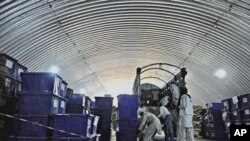As Afghanistan's Parliamentary election date approaches, many threats pose great obstacles.
Threat one is the Taliban. The militant group said Thursday it plans to attack polling stations throughout the country and urged Afghans to boycott the September 18 elections. More than 10 million people are eligible to vote for some 2,500 candidates.
Insurgents have already killed at least three candidates and several campaign workers in the run-up to the vote.
Amnesty International said Thursday that female candidates are at particular risk. It says some women have told the rights group that local security forces refuse to offer them protection or investigate incidents of violence.
More than a thousand of the planned 6,800 polling places will remain closed due to security fears, thereby disenfranchising many of Afghanistan's voters.
More than 250,000 Afghan police and troops will be deployed to protect polling centers. They will be backed by international troops.
Fazil Ahmad Manawi, the chief of Afghanistan's Independent election Commission, said "Security is the first challenge, it's also the second challenge and it will also be the third challenge." He added, "If you ask me, the other problems are solvable"
Not so, says Afghanistan's main opposition leader. Abdullah Abdullah said "People are worried, people are concerned about the possibility of massive fraud and unfortunately, in spite of the experience that we all went through in the presidential elections, measures have not been taken in order to provide an opportunity for free and fair general elections. There are lots of shortcomings,"
That view is reinforced by Candace Rondeaux. She is a senior analyst for the International Crisis Group who is in Kabul. "There's no doubt that there will be massive electoral fraud this time around," she said.”We will definitely see a repeat of last year's election fraud, perhaps even on a larger scale."
The difficulty will be, however, because there will be so many candidates this time around and because the results are quite localized, that ultimately, it will hard to tell just how much fraud is taking place until several months from now.
Rondeax said "Last year, with the provincial council elections, there was massive fraud, of course, and it’s only just now, one year later, that we're finding out about the real meaning of that fraud and how it affected certain candidates in certain areas of the country. So that will be really problematic and that will also cause some delays in finding out if this parliament is really, truly legitimate."
And that, says analyst Rondeaux, will leave Afghanistan where many say it has been for decades, unable to move forward.
"Given the number of candidates who are backed by Mafia warlords, drug traffickers and other power brokers; it seems very unlikely that this new parliament, whenever it comes to fruition, will be able to confront the many challenges here in terms of corruption and insecurity. So that's really unfortunate and it really, I think, ultimately affects the way Afghans view democracy and the democratic experiment," she said.
Last year's presidential election was marred by allegations of widespread fraud, with one-third of ballots cast for President Hamid Karzai thrown out.











